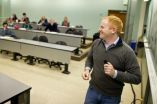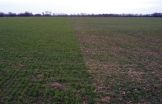(Press-News.org) WEST LAFAYETTE, Ind. - The time students invest in rereading or reviewing their notes would be better spent practicing retrieval to ensure better learning, according to new research from Purdue University.
"We continue to show that practicing retrieval, or testing yourself, is a powerful, robust tool for learning," said Jeffrey D. Karpicke (pronounced CAR-picky), an assistant professor of psychological sciences who studies learning and memory. "Our new research shows that practicing retrieval is an even more effective strategy than engaging in elaborative studying.
"Educators, researchers and students are often focused on getting things 'in memory,' so techniques that encourage students to elaborate on the material are often popular. But learning is fundamentally about retrieving, and our research shows that practicing retrieval while you study is crucial to learning. Self-testing enriches and improves the learning process, and there needs to be more focus on using retrieval as a learning strategy."
He also found that most students are not good at judging the success of their study habits.
"When students have the material right in front of them, they think they know it better than they actually do," he said. "Many students do not realize that putting the material away and practicing retrieval is such a potent study strategy."
Karpicke's findings appear in this issue of the journal Science, and the National Science Foundation supports his work.
In two studies, a total of 200 students studied texts on topics from different science disciplines. One group engaged in elaborative studying by creating concept maps - diagrams that illustrate the complicated connections and relationships in the material. The second group read the texts and then practiced retrieval; these students put the material away and practiced recalling the concepts from the text. The students returned to the lab a week later for the actual assessment of long-term learning. The group that studied by practicing retrieval showed a 50 percent improvement in long-term retention scores above and beyond the group that studied by creating concept maps.
"The final retention test was one of the most important features of our study because we asked questions that tapped into meaningful learning," he said. "The students answered questions about the specific concepts they learned as well as inference questions asking them to draw connections between things that weren't explicitly stated in the material. On both measures of meaningful learning, practicing retrieval continued to produce better learning than elaborative studying."
The students also were asked to predict which technique - practicing retrieval or elaborative studying - would be best for their long-term learning. While the majority thought that elaborative studying with concept mapping would be best, the students actually learned more by practicing retrieval.
"Students do not always know what methods will produce the best learning," he said. "It may be surprising to realize that there is such a disconnect between what students think will afford good learning and what is actually best. We as educators need to keep this in mind as we create learning tools and evaluate educational practices.
"There is nothing wrong with elaborative studying - it is certainly good for learning. But our research shows that practicing retrieval is even more effective. In addition, we used concept mapping as an elaborative study method, but we are currently exploring ways to use it as a retrieval practice technique."
Janell R. Blunt is the co-author on this article. She was a student in the Research-Focused Honors Program in the Department of Psychological Sciences, and the study was part of her undergraduate honors thesis project in 2010. Blunt is now working on her doctorate in cognitive psychology in the Department of Psychological Sciences.
Karpicke's future studies include evaluating how concept mapping can be used as part of the retrieval process, as well as other effective self-testing practices for students.
INFORMATION:
Writer: Amy Patterson Neubert, 765-494-9723, apatterson@purdue.edu
Source: Jeffrey D. Karpicke, 765-494-0273, karpicke@purdue.edu
Related websites:
Purdue College of Health and Human Sciences: http://www.purdue.edu/hhs/
Purdue Memory and Cognition Lab: http://memory.psych.purdue.edu/
PHOTO CAPTION:
Research findings by Jeffrey D. Karpicke, a Purdue assistant professor of psychological sciences who studies learning and memory, show that the time students invest in rereading or reviewing their notes would be better spent practicing retrieval, such as self-testing, to ensure better learning. (Purdue University photo/Andrew Hancock)
A publication-quality photo is available at http://news.uns.purdue.edu/images/2011/karpicke-learning.jpg
Abstract on the research in this release is available at:
http://www.purdue.edu/newsroom/research/2011/110120KarpickeScience.html
Research finds practicing retrieval is best tool for learning
2011-01-26
ELSE PRESS RELEASES FROM THIS DATE:
Tufts University calls for moderate approach to teaching personalized genomic testing
2011-01-26
BOSTON (January 24, 2011) — Genetics in Medicine, the official journal of the American College of Medical Genetics, published this month a paper by Tufts University faculty calling for a moderate, strategic approach to teaching personalized genomic testing in medical school curricula.
For 16 months, a multi-disciplinary group of Tufts University faculty examined ways to improve education regarding personalized genomic testing at Tufts University School of Medicine (TUSM). The genesis of the debate centered on whether medical students should use their own genome for ...
Genome of blue stain fungus evolved to bypass tree defense in mountain pine beetle epidemic: UBC
2011-01-26
The genome of the fungus that helps mountain pine beetles infect and kill lodgepole pines has been decoded in a University of British Columbia study.
Also known as blue stain fungus for the stain it leaves in the wood of infected trees, Grosmannia clavigera is carried to the host trees by pine beetles and weakens the trees' natural defense system, allowing pine beetles to feed and reproduce in the tree bark. A successful beetle-fungus attack ultimately causes tree death.
Now, researchers from UBC and the BC Cancer Agency's Genome Sciences Centre have conducted a detailed ...
Rhythmic vibrations guide caste development in social wasps
2011-01-26
MADISON — Future queen or tireless toiler? A paper wasp's destiny may lie in the antennal drumbeats of its caretaker.
While feeding their colony's larvae, a paper wasp queen and other dominant females periodically beat their antennae in a rhythmic pattern against the nest chambers, a behavior known as antennal drumming.
The drumming behavior is clearly audible even to human listeners and has been observed for decades, prompting numerous hypotheses about its purpose, says Robert Jeanne, a professor emeritus of entomology at the University of Wisconsin-Madison. Many have ...
Scientists find that debris on certain Himalayan glaciers may prevent melting
2011-01-26
(Santa Barbara, Calif.) –– A new scientific study shows that debris coverage –– pebbles, rocks, and debris from surrounding mountains –– may be a missing link in the understanding of the decline of glaciers. Debris is distinct from soot and dust, according to the scientists.
Melting of glaciers in the Himalayan Mountains affects water supplies for hundreds of millions of people living in South and Central Asia. Experts have stated that global warming is a key element in the melting of glaciers worldwide.
Bodo Bookhagen, assistant professor in the Department of Geography ...
Dating sheds new light on dawn of the dinosaurs
2011-01-26
Careful dating of new dinosaur fossils and volcanic ash around them by researchers from UC Davis and UC Berkeley casts doubt on the idea that dinosaurs appeared and opportunistically replaced other animals. Instead -- at least in one South American valley -- they seem to have existed side by side and gone through similar periods of extinction.
Geologists from Argentina and the United States announced earlier this month the discovery of a new dinosaur that roamed what is now South America 230 million years ago, at the beginning of the age of the dinosaurs. The newly discovered ...
Cell death pathway linked to mitochondrial fusion
2011-01-26
New research led by UC Davis scientists provides insight into why some body organs are more susceptible to cell death than others and could eventually lead to advances in treating or preventing heart attack or stroke.
In a paper published Jan. 21 in the journal Molecular Cell, the UC Davis team and their collaborators at the National Institutes of Health and Johns Hopkins University report that Bax, a factor known to promote cell death, is also involved in regulating the behavior of mitochondria, the structures that provide energy inside living cells.
Mitochondria constantly ...
Wheat resistance genes failing, new approach needed to stop flies
2011-01-26
WEST LAFAYETTE, Ind. - Many of the genes that allow wheat to ward off Hessian flies are no longer effective in the southeastern United States, and care should be taken to ensure that resistance genes that so far haven't been utilized in commercial wheat lines are used prudently, according to U.S. Department of Agriculture and Purdue University scientists.
An analysis of wheat lines carrying resistance genes from dozens of locations throughout the Southeast showed that some give little or no resistance to the Hessian fly, a major pest of wheat that can cause millions of ...
Conversion of brain tumor cells into blood vessels thwarts treatment efforts
2011-01-26
LA JOLLA, CA--Glioblastoma, the most common and lethal form of brain cancer and the disease that killed Massachusetts Senator Ted Kennedy, resists nearly all treatment efforts, even when attacked simultaneously on several fronts. One explanation can be found in the tumor cells' unexpected flexibility, discovered researchers at the Salk Institute for Biological Studies.
When faced with a life-threatening oxygen shortage, glioblastoma cells can shift gears and morph into blood vessels to ensure the continued supply of nutrients, reports a team led by Inder Verma, Ph.D., ...
Purdue team creates 'engineered organ' model for breast cancer research
2011-01-26
WEST LAFAYETTE, Ind. - Purdue University researchers have reproduced portions of the female breast in a tiny slide-sized model dubbed "breast on-a-chip" that will be used to test nanomedical approaches for the detection and treatment of breast cancer.
The model mimics the branching mammary duct system, where most breast cancers begin, and will serve as an "engineered organ" to study the use of nanoparticles to detect and target tumor cells within the ducts.
Sophie Lelièvre, associate professor of basic medical sciences in the School of Veterinary Medicine, and ...
Blue crab research may help Chesapeake Bay watermen improve soft shell harvest
2011-01-26
Baltimore, Md. (January 24, 2011) – A research effort designed to prevent the introduction of viruses to blue crabs in a research hatchery could end up helping Chesapeake Bay watermen improve their bottom line by reducing the number of soft shell crabs perishing before reaching the market. The findings, published in the journal Diseases of Aquatic Organisms, shows that the transmission of a crab-specific virus in diseased and dying crabs likely occurs after the pre-molt (or 'peeler') crabs are removed from the wild and placed in soft-shell production facilities.
Crab ...




